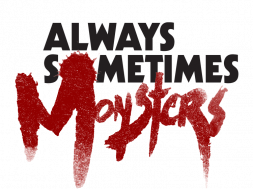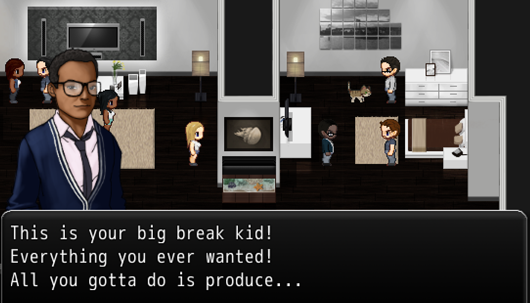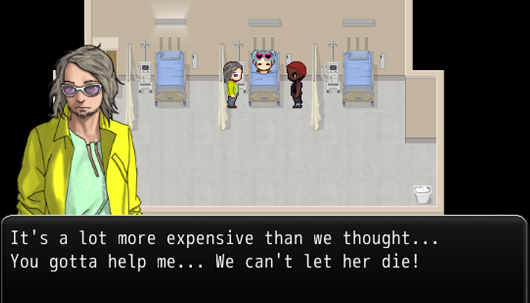
 Welcome to “At a Glance” where first impressions mean everything!. Ladies, gentlemen and struggling writers, I present to you; Always Sometimes Monsters.
Welcome to “At a Glance” where first impressions mean everything!. Ladies, gentlemen and struggling writers, I present to you; Always Sometimes Monsters.
Video games can bring us on fantastical adventures, to places impossible in reality. However, not many games deal with the theme of everyday and all that it entails. The idea of morality and choices have been tossed around in video games to various degrees of success, from the poor Karma system in the Fallout series to the choice system implemented in most Telltale games these days. These morality and choice elements are being used in a lot of games recently, with today’s game in question being designed entirely around the idea of morality. Today we are looking at a title brought to us by small indie developer, Vagabond Dog, about a story of revenge, lust, trust and above all else, choices.
Always Sometimes Monsters follows you, a writer who at a party strikes a deal with a publisher to fund your latest book. You find your partner and toast your new-found success alongside your friends. Jump cut 2 years down the line and your living alone with no money, struggling to pay your rent. You’re kicked out of your apartment, your publishing deal is cancelled and you’re left to sleep in the gutter, how could things get any worse? Wel,l turns out that your previous lover is getting married, and you’re invited. What plays out after this is a tale of numerous twisting paths, all connected directly to your choices, as you try to get the love of your life back. The story of Always Sometimes Monsters is the driving force of the game, as there is no deep gameplay here. Imagine an old SNES RPG but set in modern day, devoid of battles, but keeping the dialogue text trees. Now you may ask, how is that fun to play? Short answer is its not, but it is engaging. The game’s story is very slow to start, as the first day all you are trying to do is keep your apartment, which is no easy task and you will most likely not get the 500 dollars needed and spend the night in the street. Through this you are introduced to the game’s lively cast, all of whom are extremely memorable and come off as fully fledged people, each dealing with their own problems that you can help with or simply ignore. It’s this realistic world and cast that drives the somewhat simple plot of the game forward, as you never feel bored talking to people, you never just want to get to the gameplay because the story is exactly that.
The aspect of choice is something I mentioned earlier, and its ingrained into every single part of the game. Right off the bat you are asked to choose not only your player character, but also your lover. You do this by choosing any person in a room at a party, and whoever you choose will be the player character. Now the interesting thing is after this you choose your life partner, which will drastically change how people and the world perceive you. Gay or straight, the game changes. Scenes play out differently depending on this what seems like simple choice, and its never just there to be inclusive, it actually changes the script. Not only is it great to see gay representation in video games, but to be handled in such a interesting and mature way is to be applauded.
The choices in the game range from a number of things, sometimes simple and sometimes extravagant. For example, the first night you have a number of choices of how to get money, you can help a friend at a nightclub or help an elderly woman clean her apartment. Each option has their own choices, do you steal from the old woman to pay your rent? Or do you take the small amount she gives you anyway and sleep in the street? On the other option you are tasked to take in and give back peoples coats at a nightclub. You can either steal from the pockets or just do your job, which you can easily mess up. Its these small choices that test the player, but what I like about this element is how it handles morality. In games like Infamous for example, there’s a literal line between evil and good, you have to choose a path and you have to stick to it. I always found this way of handling such a dense topic as morality as extremely contrived and always bugged me, as its in so many different game series, offering you “good” or “bad” endings for your choices. In Always Sometimes Monsters however, the game never pushes its own ideals on you. The player simply makes a choice and it happens. No red flash comes on the screen telling you that you are evil, it just happens and you deal with it. This way of handling morality in choice based games Is a lot more mature then most titles on the market these days, and I prefer it a lot more then say, making your character more ugly as they do bad things (looking at you Star Wars:The Old Republic.)
One interesting thing I noticed while playing through the game was that of how it handles RPG mechanics. Choices and dialogue are one thing, but this game is technically an RPG, but you don’t level up in a traditional way. While playing I noticed an odd similarity between the game’s depiction of working and that of grinding in a traditional JRPG. When you aren’t busy talking to people in Always Sometimes Monsters, you should probably be working, so you head to wherever you can find it really; sometimes its given in the plot, other times its via a temp agency. You carry out menial works or labor, which really result to you the player pressing buttons in a certain sequence in order to get money. While doing this, you get in the same mind frame similar to grinding for experience in say a Final Fantasy or whatnot, except here your only in it for the money. Its fascinating how the development team took the simple concept of working and gamified it in the exact same way JRPG’s have been doing for years.
Visually, the game is serviceable. As you can see from the screen shots, you’re not here to be blow away by amazing graphics or a breathtaking visual style, its a lot more low key then that. The character sprites all look similar to their portraits which all give off the individual characters personality well. The soundtrack on the other hand is really great actually, using a wide selection of synth heavy tracks, each fitting different moments perfectly. The one gripe I have about the score is that it does get quite repetitive sometimes, especially during the working segments, but I suppose it could just cement in the feeling of repetition of hard work.
Always Sometimes Monsters feels like a labor of love, something that was created with the simplest of tools and still shines through despite its simple presentation. If you’re a person who prefers game play over story then you may not like what you find here, but if you’re someone who enjoys stepping out of their comfort zone and loves to experience weird yet grounded stories about everyday life, then this is the game for you. I think Vagabond Dog achieved their vision of telling a unique story with believable characters in a very elegant way, and in my opinion, it is one of the most personal and daring indie games out there, and that’s saying something.
You can visit the official website for more info.
You can purchase Always Sometimes Monsters on Steam, Humble Store and GoG.com













